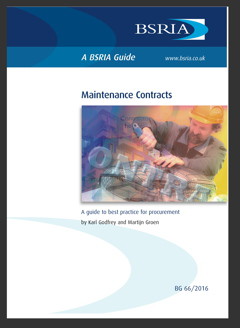The what, why and when of procuring maintenance contracts

Guidance from BSRIA is aimed at helping clients, facilities managers and their organisations to understand better the key success factors in procuring maintenance contracts. It promotes ‘cutting-edge’ tender processes and procedures, and supports the development of contract documentation — as Clair Prosser explains
There are different ways in which building maintenance can be carried out, including outsourcing and using in-house teams. Generally, maintenance operations use a ‘mix-and-match’ service-delivery vehicle.
BSRIA’s recently published and much-awaited guide to maintenance contracts* explains what is involved at each stage in the maintenance procurement process and provides a clear roadmap for minimising risks and ensuring that value for money is being achieved. It covers the development of contracts and specifications for maintenance, the tendering process, and monitoring and control.
David Bleicher, BSRIA’s training and publications manager, explains, ‘A well-maintained building will be energy-efficient, as well as optimising comfort and performance for users. But maintenance isn’t cheap, and it’s important to achieve value for money. Getting the right maintenance contract in place is vital, as is building a positive working relationship between the client and the facilities management contractor.’
Essentially everything involved with procuring maintenance services is dependent on business needs. If an organisation has a large and diverse property portfolio, then the maintenance requirements may be more complex than expected. If it needs a state-of-the-art building, then the building assets will be more expensive to maintain. If the business relies solely on its building to operate, assets become business critical, and the primary objective is to prevent failures and breakdowns.
Getting your head around all the aspects involved with defining business requirements can be a demanding task — especially when developing the building and asset registers, the maintenance specification and choosing the right maintenance strategy and regime.
The balance of in-house against outsourced
Outsourcing may not always be the best option. This would be the case where an organisation employs people with the right skill level and competencies and has invested in training. However, specialist services and a proportion of statutory testing will still have to be externalised. Specialist external services will also be required when there are risks involved with delivering maintenance services in-house.
For most organisations, it will make more sense to just outsource. This makes it possible to step back and take a strategic management role rather than getting bogged down with all that is hands-on. FMs should be taking a more pro-active stance, which allows an organisation to look both inwards and outwards. Additionally, the transfer of risk is appealing and, above all, enables an organisation to concentrate on what is core business.
Always the challenge are legal matters and the contract document
Should you use a standard form of contract such as NEC3 or CIOB? Or is using your own contract okay?
In truth, there is no right or wrong answer. A contract relies solely on its terms and conditions (T&Cs). The ‘better’ the T&Cs, the better the agreement holds up in disputes and court.
Unfortunately, organisations tend to add a lot of the information acquired during tendering (e.g. bidder’s raw tender, commercial negotiation documentation, award criteria etc.) as schedules to the contract. As this leads to a convoluted document, it is recommended to always create tailored contract documentation that includes only relevant information that is essential to the agreement. This would include the contractor’s plan and service-delivery methodology — but not their tender.
Putting it down into words — the maintenance specification
Most organisations wonder whether it is better to go input based or output based. Again, it is a matter of the organisation’s technical expertise and the amount of risk to be delegated to the supplier. However, for most organisations an output-based specification provides the best starting point, as the organisation will have a role in agreeing the final solution. This allows you to capitalise on the contractor’s technical expertise and knowledge.

Action time — tendering and evaluation
In essence, tendering a maintenance contract is similar to procuring any other FM service. Typically, the stages within the procurement processes comprise the following.
• pre-qualification of bidders
• bidders’ invitation
• bid evaluation
• commercial negotiation
• contract finalisation
• de-briefing and contract award
Public organisations also face compliance with specific procurement legislation which requires careful attention and the necessary amount of time investment to ensure that the organisation is up-to-date with the latest requirements. While private-sector organisations have more liberties, it is still considered good practice to comply with what is prescribed under the public procurement regulations — e.g. being fully transparent in your bid process, evaluation and contract award.
Obviously, the BG66/2016 maintenance contract guide explains each of these activities in more detail. But most FM practitioners will be familiar and experienced in procuring FM contracts.
Clair Prosser is with the marketing department of BSRIA.
* Maintenance Contracts: A Guide to Best Practice for Procurement Guide (BG66/2016) can be downloaded from the BSRIA Bookshop at the link below.







